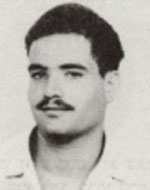David, son of Esther and Reuven, was born on May 4, 1951. He studied at the “Tel Hai” elementary school in Haifa’s Neve Sha’anan neighborhood and completed high school at Kfar Galim High School “In Haifa he was a pleasant, cheerful, comfortable and charming David, who throughout his life knew how to love people and to be loved by them, to be a loyal friend and friend, and to be a supporter of the weak. , The inanimate and every living being, from bird to human – a practical and rooted love that found a thousand ways to help and act for them.a parking lot neglected by travelers was cleaned with his own hands and the waste was taken to a garbage dump, Her interest was not in theoretical studies, but his intense curiosity and drive to recognize nature, life and man in his own ways, which were sometimes unconventional. In the agricultural school, David was the center of social life in the class, and he was one of the most dedicated and responsible people in the economy, and in the second year of his studies, at the age of sixteen, the Six-Day War broke out. Then most of the school’s instructors were recruited, and David was chosen to fill the center of the cowshed. He played this role with infinite devotion. For a week he would get up at night every two hours to take care of a sick cow and save her life. He had great intelligence and a special way to deal with plants and animals. He built an aquarium with his own hands and cultivated fish species, achieved many achievements in agricultural competitions, and invested efforts in the cultivation of animals in the economy. His approach to people was honest, cordial and practical. When he traveled on the road, he stopped his car for an elderly wife, loaded with baskets, or a mother with her children, who waited for the bus for a few hours, and saw a sick and neglected old man sitting on the steps of a house. Until David was drafted into the IDF at the end of July 1969, volunteered to serve in the air force and was assigned to the air force. After basic training he was accepted to an aviation course, but was later transferred to the Armored Corps. After completing his Patton tank course and graduating with honors, he was placed as a tank gunner in an armored battalion in the Sinai. He participated in the War of Attrition as a gunner in the company commander’s tank, and on the operational journey along the Bar-Lev line, the company commander was injured and David rescued him and coolly took over the situation. He trained the most difficult team of soldiers in his company, managed to make them exemplary soldiers, without needing a hard hand, and for that he won their admiration. David, who was strong, tall and physically powerful, never complained of difficulties. From his military service in the Suez Canal during the War of Attrition, he described in his letters about the turtle turtle, which he managed to raise, about the wonderful landscapes and the birds in the marshes in the north of the canal. He raised a nitrogen bird and followed his life, in consultation with his brother, a biology student, and with his mother, the natural teacher, about the ways of caring for the child. His parents had heard of his military exploits only by chance from friends. After completing his regular service, David decided to work in agriculture and asked to join a moshav in the Golan Heights. While waiting to approve his candidacy, and before his wedding, he decided to accumulate some money – but did not seek to do so in a convenient and easy way. He enrolled in a construction course, obtained a professional classification and began working as a contractor. His employers and colleagues admired him for his dedication to work, his responsibility, his industriousness, his intelligence and his friendly attitude toward every person – from his assistants from the territories to the contractor, the landlord. Four months before the Yom Kippur War broke outDavid married Ruthie, his girlfriend from the days of the agricultural school. A few days before the war they learned that they had been accepted as candidates for Moshav Ramot. David was very Simcha, but he did not achieve his dream. When the Yom Kippur War broke out, David was called to his unit and sent to Sinai. On October 10, 1973, in one of the battles in Hamutal, in the central sector of the Suez Canal, his tank was hit and burned, and David was hit and killed. He was missing and only four months later his body was returned and he was brought to rest in the military cemetery in Haifa. He left behind a wife, parents, two brothers and a sister. After his fall, he was promoted to sergeant. In a letter of condolence to the bereaved family, the unit commander wrote: “Despite serving briefly in the unit, David managed to stand out as a loyal friend of the weapons. The agricultural school “Kfar Galim” published a pamphlet in memory of its fallen in the Yom Kippur War, which also includes a list of his character; The battalion in which he fought published a book, “All the Stations of the Ayala,” in memory of his fallen soldiers in the war, with remarks about David
